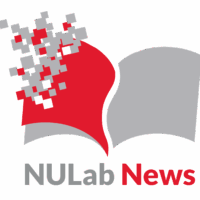The Digital Scholarship Group and NULab co-hosted a virtual Office Hours event featuring lightning talks on digital projects and research at Northeastern University. This event was part of the Digital Humanities Spring 2024 Open Office Hours series. The panel included talks by Oliver Mel Allen (Network Science), Sarah Kanouse (Art + Design), Peter Maber (English, Northeastern University London), and Seo Eun Yang (Political Science & Communication Studies).
Oliver Mel Allen discussed their project “From Flowers to Fascism: The Cottagecore to Tradwife Pipeline.” This research examines the Cottagecore to Tradwife pipeline on the Tumblr social media platform. Cottagecore is a primarily online grouping of content and content creators. This content integrates visual material showing an idealized rural lifestyle featuring activities such as wearing light and flowy clothing, breadmaking, embroidery, and foraging. Many LGBT+ people, particularly queer women, are heavily involved in creating Cottagecore content. Tradwife content focuses on gender roles in heterosexual relationships and has been associated with women on the alt right. This content contains similar visual material to Cottagecore content, raising questions about Cottagecore content potentially amplifying Tradwife content that serves as alt right propaganda (e.g. by promoting white supremacy).
To assess the extent of the overlap between Cottagecore and Tradwife content, Oliver Mel Allen analyzes the co-occurrence of Cottagecore and Tradwife tags on content posted to Tumblr. They also conduct a visual analysis of a sample of this content to reveal the extent to which it contains problematic/alt right symbols or imagery. Their preliminary results show that approximately 1.2% of content with Cottagecore tags also contain Tradwife tags. Their analysis so far has not revealed explicit white supremacy in the posts and has discovered several instances of anti-Tradwife, anti-racist, and anti-homophobic content. As their research progresses, they plan to also examine whether Cottagecore content contains Tradwife content that does not use explicit Tradwife tags.
Sarah Kanouse spoke about her collaboration with Elizabeth Solomon, a member of the Massachusett Tribe at Ponkapoag, on the project “Native Spaces.” This project seeks to support ongoing educational work while helping build native communities. It focuses on contesting the Salem Deed, which ratified land loss, and broader ideologies of property. The project does this through co-creating physical audio sites that use the listener’s location and tags to live mix multiple audio files and integrate visual art installations. Through integrating location, visual art, and audio, these sites question the politics and aesthetics of visibility while reinforcing the idea of invisible and enduring presence. The project’s visual identity will be based on designs developed for the tribe by Sadie Red Wing (Lakota). The project also works with Halsey Burgund, a local creative technologist, to use the Roundware Platform to support an offsite experience through their desktop application or an onsite experience through a QR code that allows visitors to access their mobile app.
This project focuses on developing relationships by conducting co- and intergenerational interviewing at tribal events and in people’s homes. As part of developing capacity in the tribe, it also holds audio production workshops for youth. This project aims to move forward at the speed of capacity, not on grant timelines, and negotiate appropriate priorities while supporting sustainable stewardship that also respects autonomy.
Peter Maber spoke about his collaboration with a team of researchers at Northeastern University London on the project “Mapping the Origins of West End Theatre in London.” This project maps the emergence of theater in London’s West End between 1660 and 1812. It questions traditional simplistic narratives regarding the emergence of theater that focus only on two or three theaters. The project presents the complex nature of development that occurred at over 50 sites including both licensed and legally illegitimate theaters or underground theaters that emerged in a variety of places, such as tennis courts.
This project relied on archival sources and the ArcGIS software to map these locations and their attributes. This enables a virtual “walking tour” experience and shows change over time by toggling between decades and color-coding based on time period. The project developers hope that this annotated map will serve as a valuable teaching and scholarly resource. In their future work, they would like to integrate the experiences of actors and represent the diversity of those involved in these historical developments.
Seo Eun Yang discussed her project “Analyzing Social Media Images used in Political Communication” done in collaboration with Yakov Bart. This project studies political image-making and aims to identify the verbal and visual features associated with political affiliation. It applies a multimodal fusion machine learning model to classify Instagram posts as Democratic or Republican using information from image and text embedding, a method for quantitatively representing semantic meaning. It also identifies prominent features in each group of posts including common objects, topics, people, location, and image composition across text and image modalities. In the future, the project may hire research assistants to help label images to further verify their findings regarding post classification.
Several of these research projects have been supported by NULab grants. Information on future events can be found on the NULab events page.


